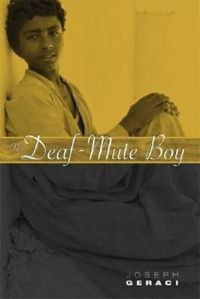The Deaf-Mute Boy (book)
From BoyWiki

The Deaf-Mute Boy (2006) by Joseph Geraci--a long-time BoyLover and BoyLove advocate--tells the modern BoyLove story (how rare!) about the travels of a BoyLover to Tunisia, and his revealing relationship with a deaf-mute Tunisian boy.
Book description
From amazon.com:
- The Deaf-Mute Boy—equal parts travel story, love story, and a resonant confrontation with the Muslim world—is the tale of a gay American professor immersed in a North African society. Maurice Burke, an archaeologist, is invited to speak at a conference in the bustling port town of Sousse, Tunisia. At first disillusioned by its rampant tourism and squalid commercialism, Maurice becomes intrigued by his surroundings after meeting a local deaf-mute boy. While exploring a vibrant souk, Maurice encounters a religious leader who guides him on a fateful introduction to the boy’s family. As Maurice’s involvement with the deaf-mute boy intensifies, he finds himself drawn into a maze of Tunisian politics, culture, and religion.
Reviews
Top Customer Reviews
- 5.0 out of 5 stars
- "A relief to be forced into silence"?
- By Elliot on March 31, 2007
- One of Joseph Geraci's tremendous skills as an author is the accessibility of his writing. The inevitable downside of this is the tendency for his work to be severely underestimated. Reviewers have variously observed that 'The Deaf-Mute Boy' is a travel story, a love story, or a cautionary tale about the imposition of one culture's values onto another's. At its core, the novel is none of these things. Rather, it witnesses the psychological deconstruction of a man, the blurring of the boundaries between his conscious and unconscious mind.
- This man is Maurice Burke, an archaeology professor at Columbia University, invited to give a series of lectures at a conference in Sousse, Tunisia. His home in New York is clearly a protective cocoon of banality; his life is busy, planned, and routine; revolving primarily around his work and his partner Eddie's daily struggle with AIDS. While in Sousse, he meets Nidhal, a 13 year old deaf-mute Tunisian boy, and it is then that the link with his life in New York begins to crumble. The signs were already in place. Maurice's career path was unconventional; when young, he was heavily entrenched into life as a Jesuit; later, he studied comparative religion and theology, before coming to archaeology. These background elements clearly indicate a man who is searching for something he has either lost, or has never had. Even within archaeology he is somewhat on the fringes: his recently published book was entitled 'Spirit of Place', in which he applied various Jungian theories in understanding the geographical siting of ancient cities and temples.
- 4.0 out of 5 stars
- Unique love story amid violence and poverty in Muslim town
- By Bob Lind on November 27, 2006
- On vacation from his archeology professorship at Columbia University, Maurice Burke is in Sousse, Tunisia to lecture at and attend a conference in that North African city. Concerned about being separated from his lifepartner, Edmund, who is fighting HIV, Maurice is impatient for the conference to be over, until he meets Nidhal, a local deaf mute boy who claims to be 15, with whom he develops a strong emotional, though strictly platonic, friendship. Trying to find out more about the boy, he explores the poorer areas of the local town, which are usually avoided by tourists as dangerous. He meets a local iman (religious teacher) and is discouraged from asking too many questions about the boy's family or how he got the bruises Maurice noticed when he was swimming. In time, Maurice becomes obsessed with the boy's situation, and postpones his departure after the conference, hoping that arrangements can be made to become a guardian of sorts for Nidhal, who has shown skills as an artist.
- The book is a well-written, colorful novel that is part love story but moreso a study into how a man's priorities can change, as well as a look at the poverty, violence, and political unrest in that country. The climax of the book is somewhat unexpected, and rather unsettling, leaving matters as muddled as they are throughout much of the book. I give it four stars out of five.
- 4.0 out of 5 stars
- A book like a mirror
- By Andrew Calimach on January 8, 2008
- Perhaps one can say that being intangible is one of the qualities of a good book. Being hard to define leaves room for many possibilities, subtleties, projections. You are no longer sure whether you are reading the book or it is reading you. It is like that with "The Deaf-Mute Boy." It is the kind of book that will have as many descriptions as it has readers, each one seeing in it what he brings himself to the reading.
- This reader brings a jaundiced view of modern culture, Eastern as well as Western. Not surprisingly, the book rewards such a reading. It throws, if you like, a scathing look upon maniacal Eastern religious fundamentalists, upon the all-too-materialist (and sexualist!) gay culture of the West, and upon the "straight" matrix against which it is profiled.
- Under attack from all directions, the protagonists escape into vulnerability and humanity. I'd like to say that in the end they are successful, but that too is my own reading - another reader may disagree completely. Regardless, Geraci has produced a work that exposes a great deal, in itself, the author, and the reader. If you let it.
See also
External Links
- Amazon.com (search the book title):
- Read/download the book at the following link:
This article is a fledgling. Help BoyWiki grow by expanding it |
